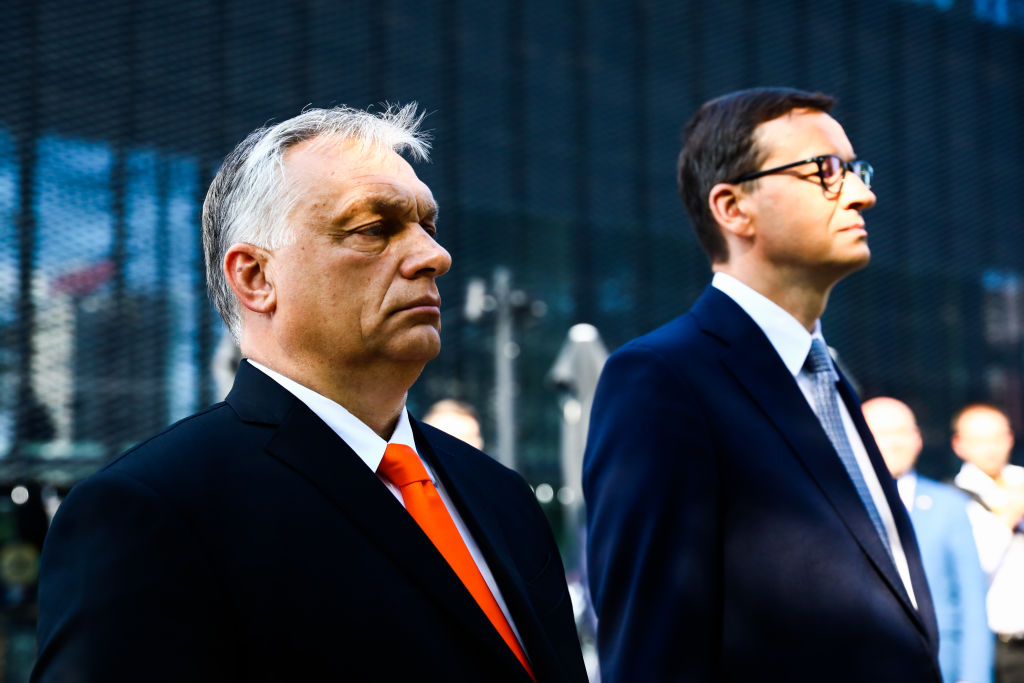With European Parliament elections looming this June, the EU’s Right-wing forces are feeling bullish. Hungarian Prime Minister Viktor Orbán, speaking at the nearly-cancelled NatCon conference in Brussels, summed up the Right’s revolutionary aspirations. “The sense of this European election is to change the leadership,” he insisted. “If the leadership proves to be bad, it must be replaced.”
Orbán took the attempted shutdown of NatCon as proof that “freedom in Europe, and especially freedom in Brussels, is in danger.” As the Right’s sense of collective purpose grows in response to this threat, so appears the likelihood of greater collaboration between Eurosceptics in Brussels. Murmurs are growing of a possible merger of the European Conservatives and Reformists (ECR) and Identity and Democracy (ID) groups within the EU, both of which are expected to gain significantly more parliament seats in this year’s elections.
Key ECR leader and former Polish prime minister Mateusz Morawiecki refused to rule out this possibility while speaking at a press conference with Orbán (whose Fidesz party is now politically homeless in Brussels), as well as a candidate for France’s National Rally, an ID member. Morawiecki said it’s “too early to say” whether a merger between the ECR and ID groups could take place after the elections, but hinted that such a move is up for discussion while confirming that he is talking “intensively” with Orbán about Fidesz joining the ECR.
The impetus for a new Eurosceptic alliance is clear. Existing groups are riddled with contradictions — take, for example, the shared ECR membership of Morawiecki’s strongly populist, Eurosceptic Law and Justice party, and the Czech Civic Democrats, whose coalition is routinely pilloried by populist opposition back home for allegedly kowtowing to Brussels. It is virtually impossible to imagine the Czechs sitting comfortably alongside Orbán if he becomes a new ECR member.
Geopolitical shifts of recent years have created similar anomalies among traditional Left-wing forces. Slovakia’s ruling SMER party was last year booted out of the Socialists & Democrats group over its views on issues ranging from Ukraine to the EU’s Green Deal, which correlate far more closely with those of the strongly Eurosceptic, anti-establishment ID group.
A merging of the ECR and ID, incorporating these now-homeless parties from Hungary and Slovakia, would dramatically change the balance of power in Brussels. The resulting Eurosceptic group would, if current election polling proves accurate, rival currently dominant pro-EU centrist groups in size and influence.
Still, the ability of such an alliance to institute wholesale change in Brussels shouldn’t be overstated. There is, after all, a paradox inherent to any attempt to bring together nationalist parties in a single international group, which potentially imposes limits on what such a group could achieve.
Orbán himself is the clearest example of how shared Right-wing ideological sympathies don’t necessarily result in the same interests or policy priorities. Morawiecki fervently “hopes Viktor will join” the ECR; yet on the Ukraine war — arguably the most pressing issue facing Europe today — the two politicians’ approaches appear deeply, even diametrically, opposed. On migration, another key issue facing the bloc, these parties largely share the same fundamental aims, but they have different national priorities resulting from their differences in geography – particularly on the question of “solidarity” and migrant redistribution among EU member states.
Still, opposition to EU federalism and political overreach overrides these national-level differences and provides a logical framework for a potential new group urging a different relationship between Brussels and EU member states. As demonstrated by the uproar over the attempted NatCon shutdown, Eurosceptic parties feel an urgent need to come together in opposition to a progressive establishment. A new alliance on the Right would not be without significant difficulties — but it may be their only hope to mould a new EU in their own image.










Join the discussion
Join like minded readers that support our journalism by becoming a paid subscriber
To join the discussion in the comments, become a paid subscriber.
Join like minded readers that support our journalism, read unlimited articles and enjoy other subscriber-only benefits.
Subscribe